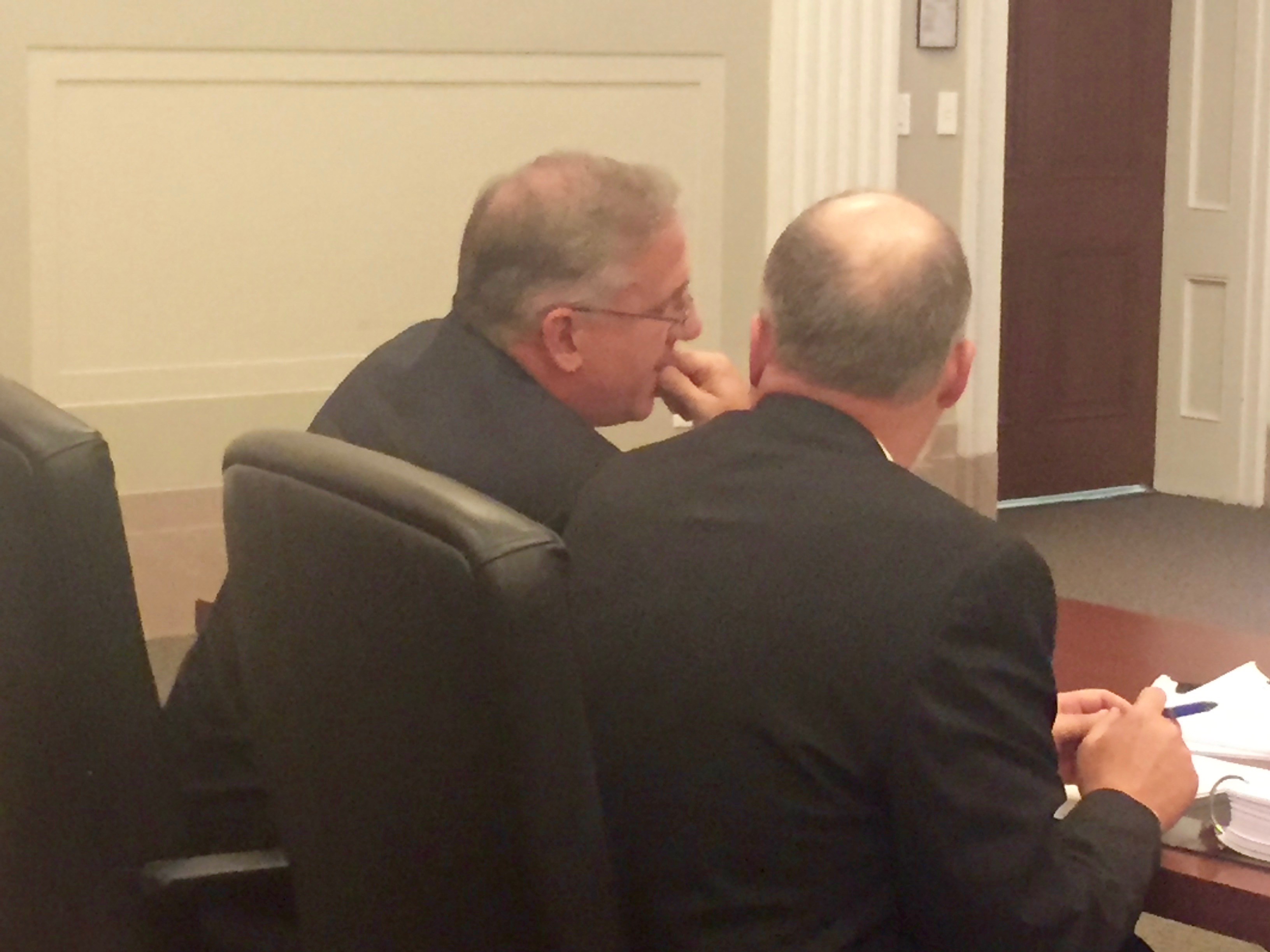 Toby Sells
Toby Sells
Stephen Jones (left) confers with his attorney Brian Faughnan (right) during Thursday’s hearing.
A state panel will decide early next week whether or not to continue hearings on alleged ethical violations by a Shelby County prosecutor accused of withholding evidence in the Noura Jackson murder trial. And one state official wondered aloud why the prosecutor’s boss wasn’t up on the same charges.
Shelby County Assistant District Attorney Stephen Jones asked a state hearing board Thursday to stop the proceedings to review his actions in the case, arguing that those actions were an “inadvertent mistake.”
The hearing panel said they would return with a decision on the Jones matter early next week.
The background:
The Tennessee Supreme Court Board of Professional Responsibility (TBPR) said in January that Jones withheld a statement from a key witness in the Jackson murder trial, a statement which could have helped Jackson’s defense in the trial and, perhaps, changed the verdict in the case.
Jackson was convicted in 2009 but the Tennessee Supreme Court overturned the conviction in 2014, based on misconduct in the case by Jones and Shelby County District Attorney General Amy Weirich. Jackson took an Alford plea in the case in May 2015 and was released from prison in August.
For his part in the case, Jones was targeted for discipline in January by the TBPR, the state agency that oversees and disciplines attorneys in Tennessee.

Weirich
Also targeted for TBPR discipline was Jones’ boss, Shelby County District Attorney General Amy Weirich. The state board said she violated Jackson’s constitutional rights with statements made during her closing arguments.
Thursday’s hearing:
The evidence at the heart of the Jones’ case, which was heard Thursday, is the written statement by one of Jackson’s friends, Andrew Hammack, who was a suspect in the murder of Jackson’s mother, Jennifer.
He gave three statements to Memphis police, but in the statement that was withheld, Hammack said he was on the drug ecstasy the night of the murder and that he did not have his phone with him. However, he previously testified that Jackson called him at the time of the murder and said she was in her mother’s house at that time.
Jones received the statement, looked at it, and claims to have stuffed it into a legal folder and simply forgot about it until the trial was over, he has said. His lawyer argued Thursday that the action was a mistake and should not trigger an ethics violation.
There was never a “conscious decision to withhold” any documents from defense attorneys, said Jones’ attorney Brian S. Faughnan, adding that ideas to the contrary were a “matter of imagination.”
Faughnan said Jones is “one of the best attorneys in this room,” that “in every step of the process, he admitted he made a mistake and wouldn’t do it again,” and for this “there is no need to go through a trial.”

Faughnan
Faughnan also argued that nine other Tennessee judges (including five Tennessee Supreme Court justices) had not brought any ethical complaints against Jones in the matter.
Krisann Hodges, deputy chief disciplinary counsel for the TBPR, argued that those judges were weighing the facts of a criminal case before them at the time, not whether Jones had committed ethical violations, which is the purview of the TBPR.
While Jones’ attorney said the action wasn’t intentional, Hodges argued that there are no protections covering intentions for prosecutors. That is, it doesn’t matter if Jones did not intend to withhold evidence in the Jackson trial; it only matters that he did, in fact, withhold the evidence.
Was it intentional?
But that fact — whether or not Jones intentionally withheld the evidence — became a central point of one part of Thursday’s hearing. The discussion of that point had those in the court sitting up in their seats.
Hearing board member Leland McNabb asked whether or not Jones’ intentions were disputed.
“Yes, sir,” said the Hodges, the state’s attorney. McNabb said if that were the case, then the hearing had to go on to review that fact.
Hodges said that Jones saw the statement from Hammack, knew that it was a large piece of the prosecution’s case against Jackson, and withheld it, noting that “this was more than a mistake.”
‘Are we leaving someone out?’
McNabb said Weirich should have handed over the Hammack statement to the defense after she examined Hammack on the stand during the trial. He wondered aloud if Weirich, too, should be charged along with Jones.
“Are we leaving someone out [of the charges against Jones]?” McNabb asked, seemingly referencing Weirich.
Hodges noted that that the charges before them at the hearing were against Jones and that Weirich has her own hearing scheduled. But McNabb splayed his hands wide before him and said, “But it’s of interest.”

Jackson in public
Jackson was present at Thursday’s hearing. She looked calm and casual, wearing jeans and her hair pulled back in a clip. She made a brief statement to the press after the hearing and left the trial room away from the press scrum.